-
 Bitcoin
Bitcoin $107,295.8208
-0.70% -
 Ethereum
Ethereum $2,492.0775
0.43% -
 Tether USDt
Tether USDt $1.0003
0.01% -
 XRP
XRP $2.2672
2.59% -
 BNB
BNB $657.3063
0.71% -
 Solana
Solana $155.4040
0.64% -
 USDC
USDC $1.0001
0.03% -
 TRON
TRON $0.2798
1.48% -
 Dogecoin
Dogecoin $0.1657
-2.25% -
 Cardano
Cardano $0.5757
-0.98% -
 Hyperliquid
Hyperliquid $40.1401
2.38% -
 Bitcoin Cash
Bitcoin Cash $505.7437
0.22% -
 Sui
Sui $2.7808
-3.95% -
 Chainlink
Chainlink $13.4275
-1.93% -
 UNUS SED LEO
UNUS SED LEO $9.0389
-0.23% -
 Avalanche
Avalanche $17.9698
-4.20% -
 Stellar
Stellar $0.2390
-0.94% -
 Toncoin
Toncoin $2.9224
0.36% -
 Shiba Inu
Shiba Inu $0.0...01144
-4.23% -
 Litecoin
Litecoin $86.8633
-1.49% -
 Hedera
Hedera $0.1507
-1.64% -
 Monero
Monero $321.0263
2.89% -
 Polkadot
Polkadot $3.4103
-3.78% -
 Dai
Dai $1.0000
0.02% -
 Bitget Token
Bitget Token $4.5517
-1.30% -
 Ethena USDe
Ethena USDe $1.0003
0.01% -
 Uniswap
Uniswap $7.1448
-4.37% -
 Aave
Aave $273.9902
-1.95% -
 Pepe
Pepe $0.0...09786
-5.75% -
 Pi
Pi $0.5090
-5.09%
How to retrieve Bitcoin wallet addresses after they are lost?
Bitcoin wallet recovery hinges on backup methods; hardware wallets offer the best chance via seed phrases, while software wallets rely on seeds or password resets. Paper wallets are easily recoverable if undamaged, but lacking any backup makes recovery extremely difficult, if not impossible.
Mar 14, 2025 at 08:26 am
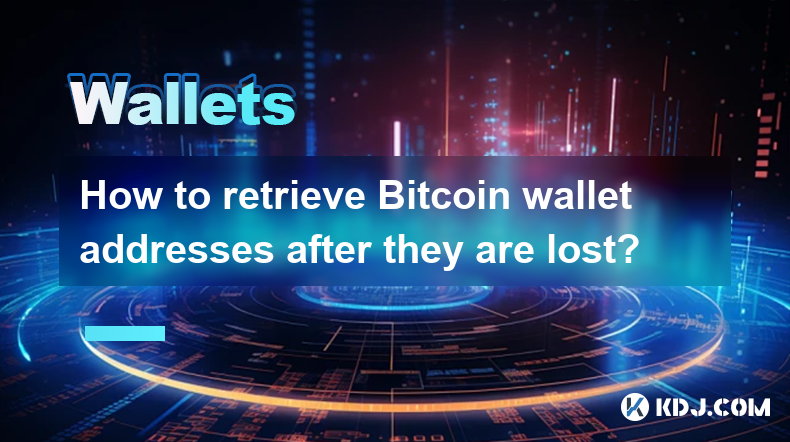
Key Points:
- Recovery methods depend heavily on how the Bitcoin wallet was stored and what information you still possess.
- Hardware wallets offer the best recovery options, but require careful adherence to backup procedures.
- Software wallets have varying recovery methods, some relying on seed phrases, others on password recovery.
- Paper wallets provide a simple recovery mechanism if the paper is undamaged and the information is legible.
- If no backups exist, recovering your Bitcoin addresses is extremely difficult, potentially impossible.
How to Retrieve Bitcoin Wallet Addresses After They Are Lost?
Losing access to your Bitcoin wallet addresses can be a devastating experience. The process of retrieval depends entirely on how you originally stored your Bitcoin wallet. There's no universal solution; the method varies significantly. Let's explore the common scenarios and recovery paths.
Hardware Wallets:
Hardware wallets, like Ledger and Trezor, are considered the most secure method of storing Bitcoin. Their recovery process usually involves a 12-24 word seed phrase. This phrase acts as the key to your entire wallet. If you have safely stored this seed phrase, you can use it to restore your wallet on a new device. This will give you access to your Bitcoin addresses and funds. However, if you've lost or misplaced your seed phrase, recovering your Bitcoin addresses is practically impossible.
Software Wallets:
Software wallets, whether desktop or mobile applications, offer varying levels of recovery options. Some wallets rely on a seed phrase, similar to hardware wallets. Others might use password recovery mechanisms. If you've enabled two-factor authentication (2FA), you might need access to your secondary device for verification. Always carefully note your seed phrase or password and store it securely. Without these, recovering your Bitcoin addresses and associated funds is highly challenging.
- Finding your seed phrase: Check your email or device notes for any record of your seed phrase.
- Password reset: Try the password recovery option within the wallet software, if available.
- Contacting support: Reach out to the wallet provider's customer support for assistance. However, remember they can't access your private keys.
Paper Wallets:
Paper wallets are a simple, offline method of storing Bitcoin addresses and private keys. The recovery process is straightforward if you still have access to your undamaged paper wallet. Simply copy the private key from the paper wallet to a new wallet application. However, if the paper wallet is lost, damaged, or the information is illegible, recovery is extremely difficult. It's crucial to store your paper wallet securely and make multiple backups.
What if I have no backups?
This is the most challenging scenario. Without any backups—seed phrases, passwords, or a paper wallet—recovering your Bitcoin addresses is exceptionally difficult, if not impossible. The private keys are essentially lost, and the associated Bitcoin is effectively inaccessible. The blockchain is public, meaning the transactions are recorded; however, without the private keys to unlock your addresses, you cannot access the funds.
Frequently Asked Questions (FAQs):
Q: Can I recover my Bitcoin addresses if I only remember part of my seed phrase?
A: Unfortunately, most wallet systems require the entire seed phrase to restore access. Partial phrases are typically insufficient for recovery.
Q: Is it possible to recover my Bitcoin addresses through the blockchain?
A: The blockchain records transactions, but it doesn't reveal private keys. Knowing transaction details doesn't give you access to the funds without the associated private key.
Q: Can I hire a professional to recover my lost Bitcoin addresses?
A: While some services claim to offer Bitcoin recovery, be wary of scams. Legitimate professionals can't magically retrieve lost private keys. Their services may involve exploring available backups or assisting with software-related issues, but success isn't guaranteed.
Q: What should I do to prevent losing my Bitcoin wallet addresses in the future?
A: Implement a robust backup strategy. Use a hardware wallet, meticulously record your seed phrase (multiple times, in different secure locations), and avoid relying solely on a single method of storage. Regularly back up your software wallets and store your backups securely offline.
Q: If my hardware wallet is damaged, can I still recover my Bitcoin?
A: If you have your seed phrase, you can recover your funds onto a new device. However, if the device is damaged beyond repair and you don't have your seed phrase, recovery is likely impossible.
Q: My software wallet is no longer available. Can I still recover my Bitcoin?
A: If you have the seed phrase or access to a password recovery mechanism, you may be able to restore your wallet using a new instance of the same software or a compatible alternative. Without this information, recovery is unlikely.
Disclaimer:info@kdj.com
The information provided is not trading advice. kdj.com does not assume any responsibility for any investments made based on the information provided in this article. Cryptocurrencies are highly volatile and it is highly recommended that you invest with caution after thorough research!
If you believe that the content used on this website infringes your copyright, please contact us immediately (info@kdj.com) and we will delete it promptly.
- SUI, TVL, BlockDAG: Navigating the Altcoin Landscape with Strategic Vision
- 2025-07-01 04:30:12
- BlockDAG, Cryptos, 2025 Trends: What's Hot and What's Not
- 2025-07-01 05:10:12
- Avalanche's Reign Challenged: Will Ruvi AI Lead the Next Bull Run?
- 2025-07-01 05:10:12
- Score Big with BetMGM Bonus: MLB, Soccer, and More!
- 2025-07-01 05:15:12
- Solana ETF, Staking Rewards, and Institutional Access: A New Era?
- 2025-07-01 05:50:12
- Filecoin (FIL) Gains Trade Momentum: A New Yorker's Take
- 2025-07-01 06:10:12
Related knowledge
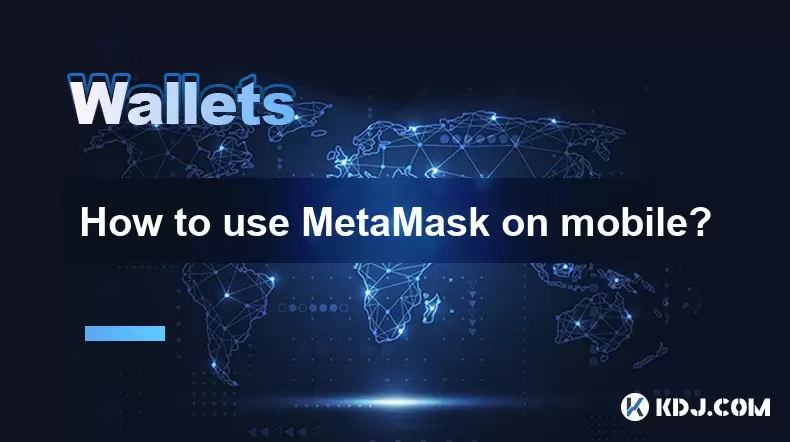
How to use MetaMask on mobile?
Jul 01,2025 at 06:00am
What is MetaMask and Why Use It on Mobile?MetaMask is one of the most widely used cryptocurrency wallets, offering users a secure way to interact with decentralized applications (dApps) on the Ethereum blockchain. While traditionally used as a browser extension on desktops, MetaMask also provides a mobile app, enabling seamless access to your crypto ass...
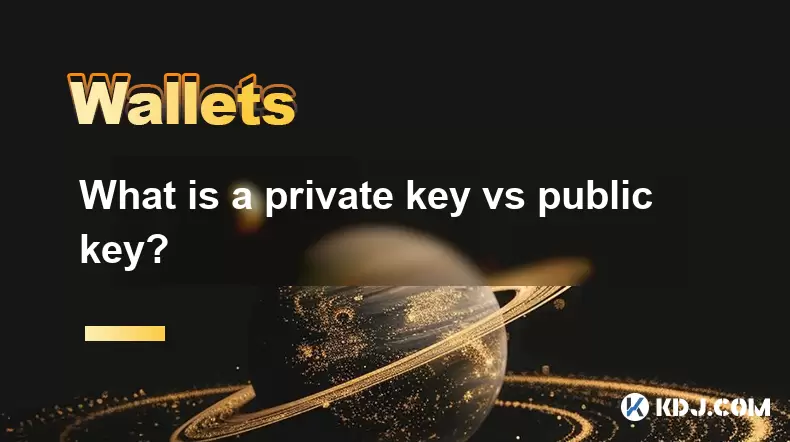
What is a private key vs public key?
Jul 01,2025 at 04:21am
Understanding the Basics of Cryptographic KeysIn the world of cryptocurrencies, the terms private key and public key are foundational. These keys form the backbone of blockchain security and ensure that digital assets remain protected while allowing for transparent transactions. At their core, these keys are part of a cryptographic system known as asymm...
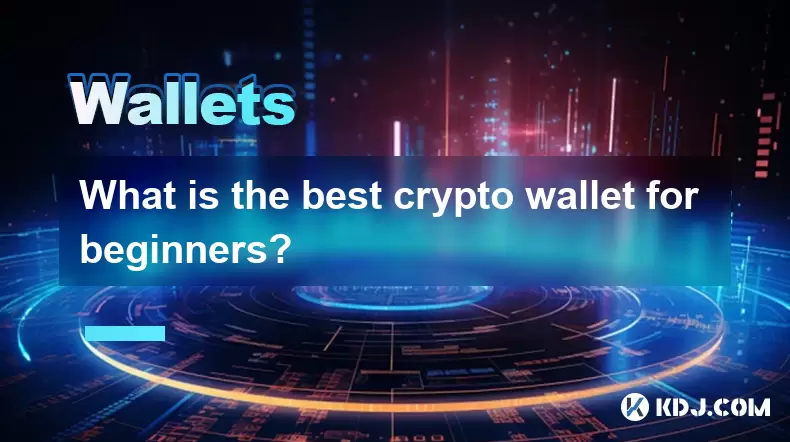
What is the best crypto wallet for beginners?
Jul 01,2025 at 02:42am
Understanding the Basics of Crypto WalletsA crypto wallet is a digital tool that allows users to store, send, and receive cryptocurrencies securely. Unlike traditional wallets that hold physical cash, crypto wallets do not actually store coins. Instead, they manage the private keys that grant access to blockchain addresses where your funds are recorded....
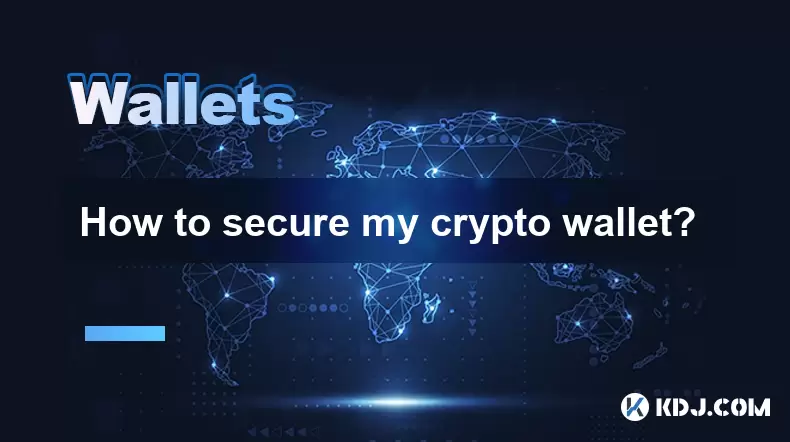
How to secure my crypto wallet?
Jul 01,2025 at 03:28am
Understanding the Importance of Crypto Wallet SecuritySecuring your crypto wallet is a fundamental aspect of managing digital assets. Unlike traditional bank accounts, cryptocurrency wallets do not have centralized institutions to reverse fraudulent transactions or recover lost funds. Therefore, security measures must be proactively managed by the user....
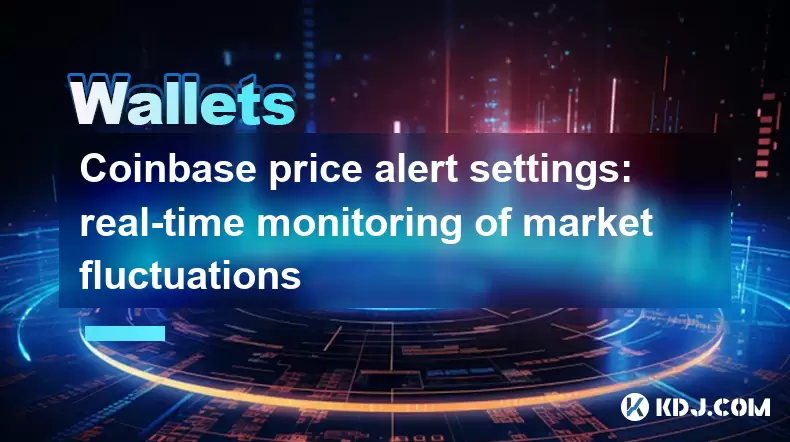
Coinbase price alert settings: real-time monitoring of market fluctuations
Jun 29,2025 at 07:00am
Setting Up Coinbase Price AlertsTo begin real-time monitoring of market fluctuations on Coinbase, users can utilize the built-in price alert feature. This function allows you to receive notifications when a cryptocurrency reaches a specific price point. To access this setting, open the Coinbase app or log in via the web platform. Navigate to the 'Prices...

How to stake cryptocurrencies on Coinbase? Benefits and risks
Jun 27,2025 at 06:36pm
Understanding Cryptocurrency Staking on CoinbaseStaking cryptocurrencies involves locking up digital assets to support the operations of a blockchain network, typically in return for rewards. Coinbase, one of the most popular cryptocurrency exchanges globally, offers staking services for several proof-of-stake (PoS) coins. Users can stake their holdings...

How to use MetaMask on mobile?
Jul 01,2025 at 06:00am
What is MetaMask and Why Use It on Mobile?MetaMask is one of the most widely used cryptocurrency wallets, offering users a secure way to interact with decentralized applications (dApps) on the Ethereum blockchain. While traditionally used as a browser extension on desktops, MetaMask also provides a mobile app, enabling seamless access to your crypto ass...

What is a private key vs public key?
Jul 01,2025 at 04:21am
Understanding the Basics of Cryptographic KeysIn the world of cryptocurrencies, the terms private key and public key are foundational. These keys form the backbone of blockchain security and ensure that digital assets remain protected while allowing for transparent transactions. At their core, these keys are part of a cryptographic system known as asymm...

What is the best crypto wallet for beginners?
Jul 01,2025 at 02:42am
Understanding the Basics of Crypto WalletsA crypto wallet is a digital tool that allows users to store, send, and receive cryptocurrencies securely. Unlike traditional wallets that hold physical cash, crypto wallets do not actually store coins. Instead, they manage the private keys that grant access to blockchain addresses where your funds are recorded....

How to secure my crypto wallet?
Jul 01,2025 at 03:28am
Understanding the Importance of Crypto Wallet SecuritySecuring your crypto wallet is a fundamental aspect of managing digital assets. Unlike traditional bank accounts, cryptocurrency wallets do not have centralized institutions to reverse fraudulent transactions or recover lost funds. Therefore, security measures must be proactively managed by the user....

Coinbase price alert settings: real-time monitoring of market fluctuations
Jun 29,2025 at 07:00am
Setting Up Coinbase Price AlertsTo begin real-time monitoring of market fluctuations on Coinbase, users can utilize the built-in price alert feature. This function allows you to receive notifications when a cryptocurrency reaches a specific price point. To access this setting, open the Coinbase app or log in via the web platform. Navigate to the 'Prices...

How to stake cryptocurrencies on Coinbase? Benefits and risks
Jun 27,2025 at 06:36pm
Understanding Cryptocurrency Staking on CoinbaseStaking cryptocurrencies involves locking up digital assets to support the operations of a blockchain network, typically in return for rewards. Coinbase, one of the most popular cryptocurrency exchanges globally, offers staking services for several proof-of-stake (PoS) coins. Users can stake their holdings...
See all articles

























































































